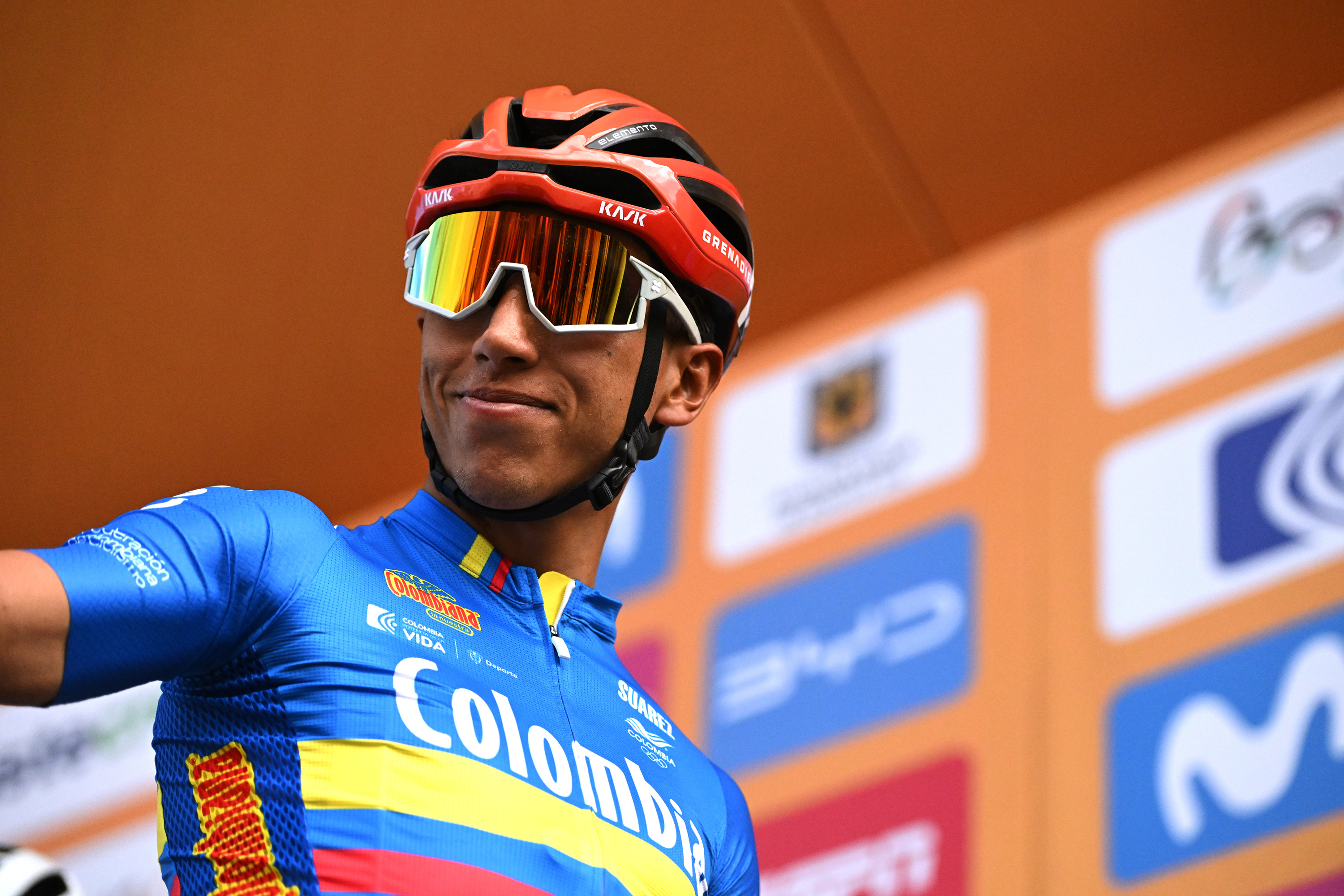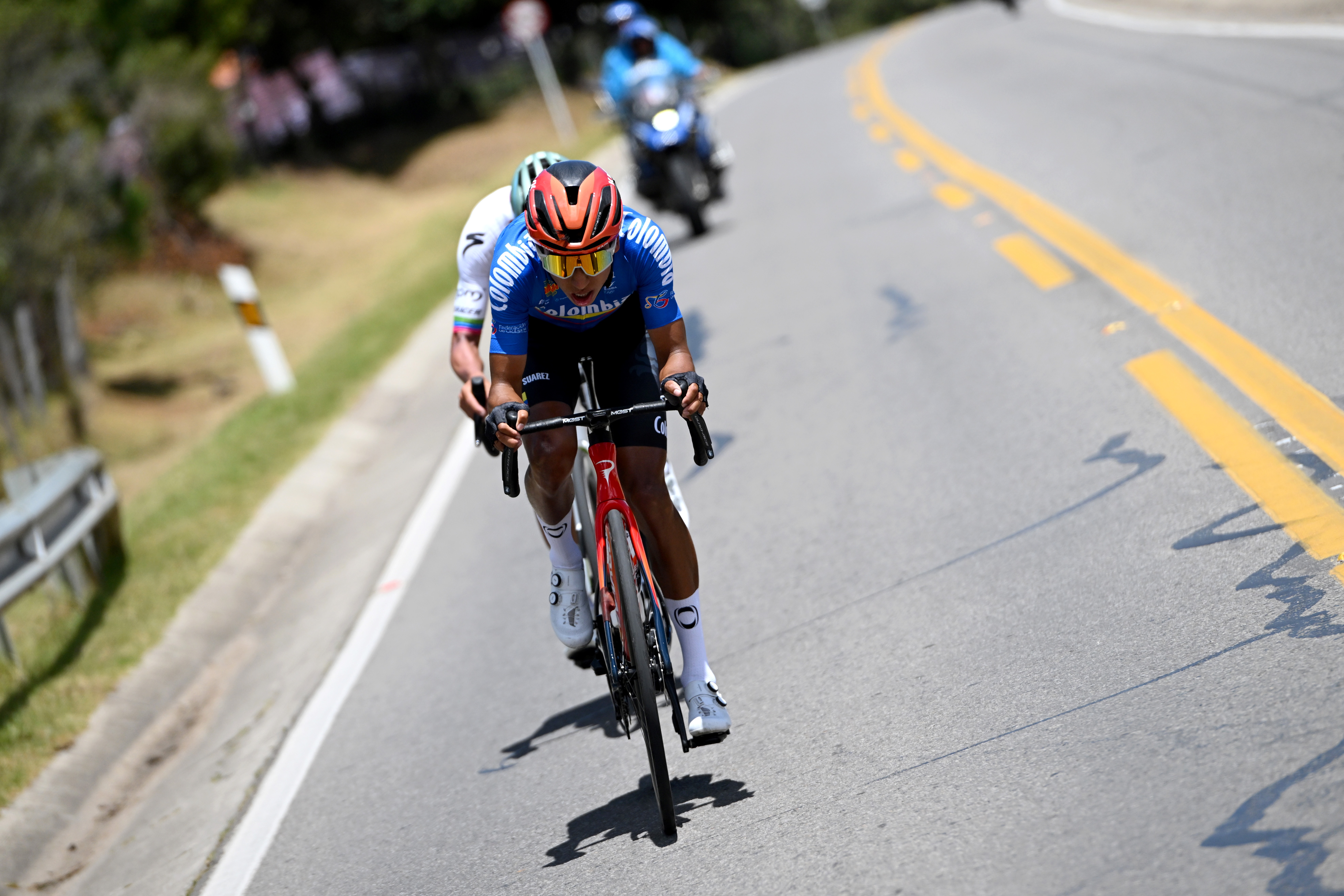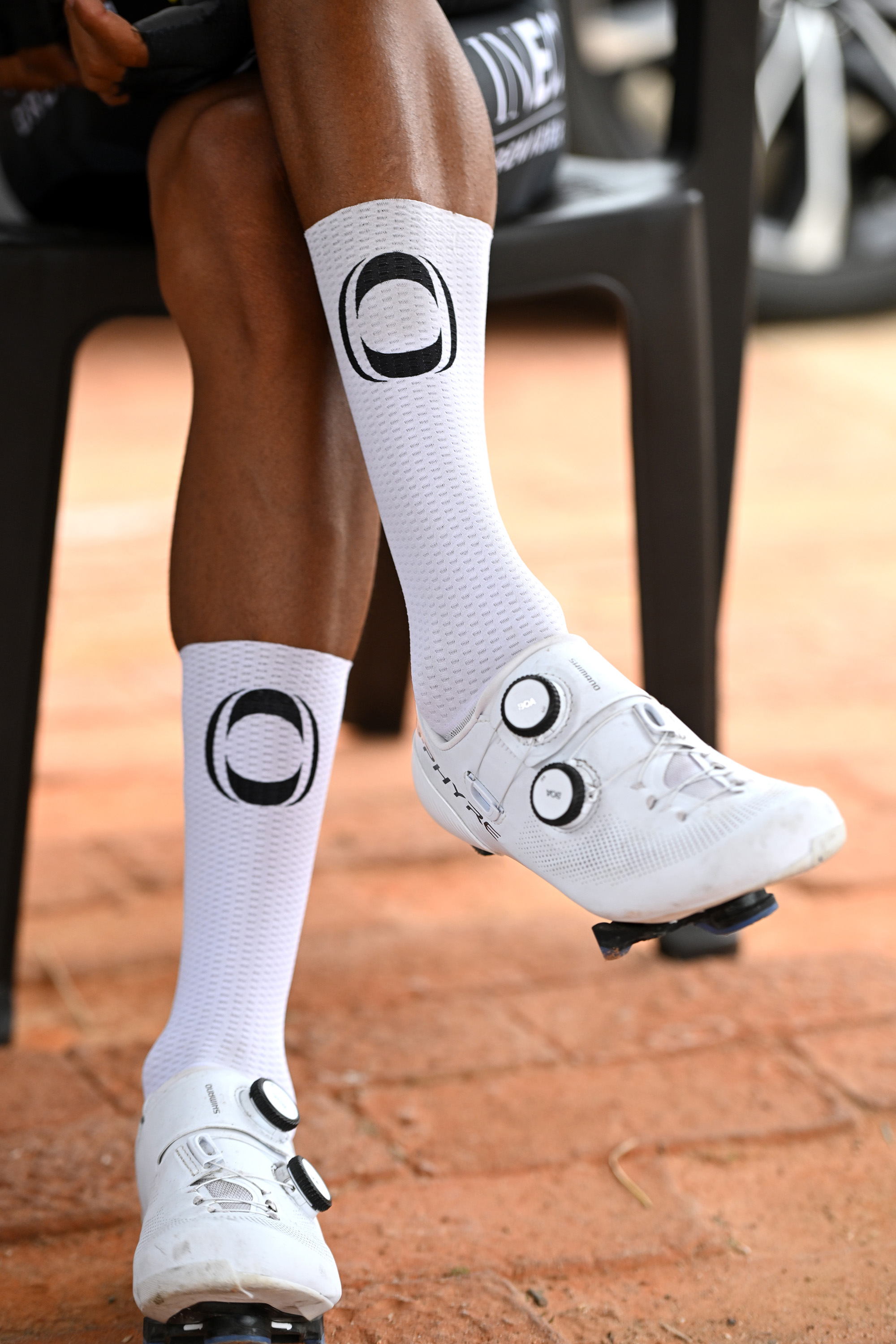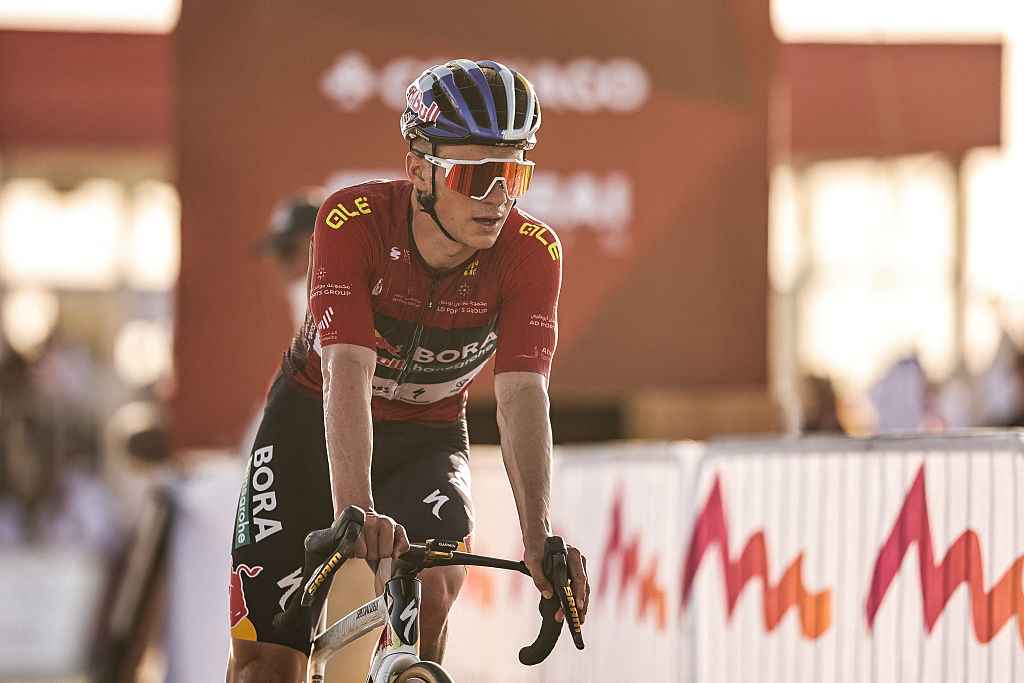'I don't have to prove anything to anyone' – Egan Bernal finds joy in comeback
Ineos rider on being competitive again and being a Colombian idol

The latest race content, interviews, features, reviews and expert buying guides, direct to your inbox!
You are now subscribed
Your newsletter sign-up was successful

It’s one thing to suffer faster than your rivals, but it takes a rare breed of rider to suffer with more elegance. Two years on from the crash that nearly ended his life, Egan Bernal is still sifting for the golden form that carried him to the zenith of his sport, yet the style of those days has never left him.
It was in evidence again on Saturday on the Alto del Vino, the decisive rendezvous of the Tour Colombia. In the space of an hour and change, the race scaled almost 2,000 vertical metres, following a two-lane road that rose steadily from the clammy heat of Villeta towards a far-off summit flecked with afternoon mist. The pace was fierce, and the yellow jersey group, like the air, grew thinner with every kilometre that passed.
With 20km remaining, Nairo Quintana was irretrievably dropped, doomed to lose more than six minutes by the top. Later, as Richard Carapaz and his EF Education-EasyPost teammates took turns to attack, it occasionally looked as though Bernal might suffer a similar fate. Yet every time a gap opened, he found a way to close it again, nimbly stitching himself back into the race with those familiar, almost languid pedal strokes.
Even when Bernal was definitively distanced nearer the summit, his pedalling remained fluid. His face wore just a hint of a grimace. He crossed the line in fourth place, 33 seconds down on his old teammate Carapaz. Not where he used to be before, and not quite where he wanted to be now, but getting closer.

It’s early on Tuesday morning, and the peloton is assembling for the opening stage of the Tour Colombia. The event was confirmed too late in the winter for Ineos Grenadiers to add it to their calendar, but Bernal was never going to miss out on the chance to ride and he was freed to line up at the head of the Colombian national team for the week.
La Selecciòn have arrived at the start earlier than most teams. Bernal had already agreed to sit down with Cyclingnews at some point during the week in Colombia and so, with ample time to kill before the race gets underway, he figures there’s no time like the present.
“I enjoy cycling a lot more now,” Bernal says after settling into a plastic seat, wearing an Ineos jacket over his national team jersey. “I enjoy everything in life more now, really. I’m enjoying the little things, like getting home to see my dog or seeing my mother. Everything. I’m enjoying everything in a different way.”
The latest race content, interviews, features, reviews and expert buying guides, direct to your inbox!
A little over two years have passed since Bernal suffered the training crash that threatened his life and changed his career, and the scale of his injuries still makes for horrific reading. He sustained fractured vertebrae, a fractured femur, a fractured patella and a punctured lung when he crashed into a stationary bus. Doctors at the Universidad La Sabana clinic north of Bogotá initially warned that he had a 95% chance of paralysis. For weeks afterwards, it seemed inappropriate even to wonder if he might ever resume his career. Astonishingly, Bernal was back on his bike within two months and in the peloton again by late summer.
When Bernal marked the anniversary of the crash at the Vuelta a San Juan a year ago, most questions focused on his memories of the incident itself and the rigours of the early part of his rehabilitation. Twelve months on, and with Bernal having completed two Grand Tours in 2023, the emphasis has shifted towards what he might reasonably achieve in the future.
Late last month, after all, Bernal secured his first podium finish of any kind since winning the 2021 Giro d’Italia when he took bronze at the Colombian national championships. In the mixed zone afterwards, he raised home hopes still further by noting that he felt like “the Egan of before.” Ten days on, he tempers that sentiment slightly. The road is still long.
“I think the sensations are better in respect to last year, but it’s a question of keeping my feet on the ground,” he says. “Let’s say that the numbers are growing bit by bit, but there’s still work to do. I’ve already been working very hard for the last two years, but this is a long process.
“In this moment, we can say that things are going well and – nada – let’s see. This is still only the start of the season, and anything could happen. In my head, rather than the numbers and thinking about whether I’m ‘back’ or not, I’m just going race by race. I’m giving the best of myself in every race I do with the aim of improving as time goes by.”

From the outside, brief cameos in San Juan and the Tour de Romandie aside, the 2023 season looked like an ordeal for Bernal. He laboured anonymously at the Tour de France, placing 36th in Paris, and then repeated the hardship at the Vuelta a España, reaching Madrid in 55th overall. Yet despite those travails, Bernal insists that he enjoyed his summer of Grand Tour racing, and not only because he felt he was sinking firmer foundations for 2024.
“Physically, it was very difficult, because I wasn’t the best version of myself and I was suffering quite a lot,” Bernal explains “But every time I had a moment where I was struggling mentally, I’d remind myself, ‘I’m alive,’ and that was already a win for me.
“As cyclists, when we’re in the middle of it all, we sometimes forget about what’s beyond it. We look only at things in terms of the world of cycling – Did I win or not? Did I feel good on the bike or not? – but there is a lot more to cycling than that for me.
“There’s the fact that I’m alive. There’s the fact that when I lift my head in the Alps, I can see the most beautiful landscape imaginable. I enjoyed it. It was beautiful, in fact. It was a different year for me, but obviously I enjoyed it.”
There’s the fact that when I lift my head in the Alps, I can see the most beautiful landscape imaginable
It wasn’t on anything remotely like the same scale, of course, but Bernal has made a significant comeback once before. When he reached Milan’s Piazza Duomo in the maglia rosa in 2021, he delivered an introspective press conference that put one in mind of Tom Dumoulin’s candour in such situations. “I had doubts about being on the same level again,” Bernal confessed then. “On this Giro, I’ve found something that I had lost.”
A back injury had ruined Bernal’s defence of his Tour title the previous September and the issue had continued to nag at him throughout his preparation for the Giro, but the physical ailment was only the half of it. Winning the Tour at just 22 years of age had provoked something of an existential crisis. “I didn’t know what to do with my life,” Bernal confessed after that Giro victory. “It was like – what now?”
Returning to everyday life after the 2019 Tour must have felt like coming back from the moon, though Bernal insists now that he never fell out of love with the bike, not even when the claustrophobic demands of being Colombia’s first-ever winner in Paris had long since ceased to be a novelty.
“No, I always liked it,” he says. “Maybe it was more than I didn’t know how to deal with some of the changes that were happening, because my life changed then. I was still a kid, but when I came back to Colombia, I couldn’t go out on the street, and it was hard even to get out training. In Colombia, it was a locura, it was crazy. All of that side of it was difficult, but getting out on my bike was always something I loved. Going out and riding for seven or eight hours isn’t work for me.”

Public admissions of vulnerability aren’t typically part of a champion’s profile, but that’s partly why Bernal is such a compelling figure. In 2020, when he lost all hope of Tour victory on the Grand Colombier, he spent the bones of fifteen minutes at the summit giving reporters an unvarnished account of his defeat in Spanish, Italian and English. In the winter of 2021, he picked up a microphone in Chía eatery Andrés Carne de Res to issue a very public apology to his girlfriend Mafe, the veterinarian he had met while she was working in that same restaurant as a student.
Now, as Bernal continues on the long road back from January 24, 2022, he has no qualms about sharing his doubts about the route still ahead of him. His race programme for the season ahead, he admits, is written in water. He will ride O Gran Camiño this month, but there are no guarantees yet about which Grand Tour he will ride.
“You can make a plan for the year, but things can change, especially given the condition I’m in,” he says. “Sometimes maybe you don’t see things as they really are yourself, but ultimately have to be going well to get sent to certain races. If you’re not, you’ll be sent to other ones. It’s simple, really. You can plan to go to the Giro, Tour or the Vuelta, but ultimately, you have to be going well.”
There is a curious tendency in cycling to see indignity in the suffering of a champion, as if their previous palmarès are somehow diminished in value by their spending sustained amounts of time at the rear of the bunch. Bernal, sensibly, has no truck with such considerations. In sport, as in life, the past is history and the future unwritten. Best to savour the present.
“I don’t have to prove anything to anyone, I just keep doing it because I like it,” he says. “I like being competitive, I like pinning on a number, I like the nerves you feel before you start a race. I love all of that. Obviously, the crash and everything else gives you a different perspective on life too, so you have to put emphasis on the things that are important to you.”

Zipaquirá is 50km north of Bogotá and a popular day trip for tourists to the capital due to its underground salt cathedral. Its two most famous living citizens are Colombia’s first Tour winner and the nation’s current president, Gustavo Petro, and their stories have overlapped.
Bernal was raised in a barrio known as Bolívar 83, which was founded by a Petro-led group of student activists and members of the revolutionary guerilla movement M-19. The neighbourhood took shape in 1982 after students campaigning on behalf of the city’s poor arranged the occupation of wasteland owned by the church, though it was largely bereft of public services until the turn of the century.
After the 2019 Tour, Petro, by then a left-wing senator, posted a tweet pointing out that he had built the neighbourhood in which Bernal had grown up. When Petro was accused of trying to appropriate Bernal’s triumph for political gain, the maillot jaune came to his defence.
In 2022, however, when Petro made his second, successful bid for the Colombian presidency, Bernal voiced his opposition by backing rival candidates ahead of both rounds of the election. He faced criticism on social media for his stance, and a mural of the cyclist in Zipaquirá was defaced. “Disappointment, you don’t represent us,” read the slogan daubed across it.
“It’s understandable,” Bernal says now. “In Colombia, when a public figure speaks out about a very difficult political theme – or more accurately, about a social theme – you have to be conscious that a lot of people are going to agree with you and a lot of people are going to be upset. You know that before you write it or publish it.
“But it’s also what I think and what I believe, and I felt like expressing it. A lot of people agreed, and a lot of people didn’t. What I said made an impact because people love me. In the end, that’s a good thing. It would be worse if I said something, and nobody cared, so it was understandable.
“On the street, nobody said anything about it to me, which was a bit surprising, actually. I think people behaved very well. On social media, people were saying things alright, but that’s normal. But on the street, I never had a bad word said to me.”
The episode was proof, as if it were needed, of the intense spotlight trained upon Bernal in his home country. His willingness to wade into the political arena rather than stick safely to sports, on the other hand, suggested that he was increasingly at ease with his status as a public figure. In any case, his opinion of the president has done little to dent his own standing. If anything, the Colombian public has increasingly warmed to Bernal in the two years since his crash.
There was certainly only affection on view when the Tour Colombia visited Zipaquirá on stage 4. The largest crowds of the race to that point were wedged against the barriers all along Carrera 15. After the stage ended, Bernal was called to the podium to receive the recognition of his hometown. “Your champion, the champion of life, the boy wonder!” the speaker cried as Bernal emerged on the dais alongside teammate and fellow Zipaquirá citizen Brandon Rivera. The multitudes responded in kind: “E-gan! E-gan! E-gan!”

I want to be a rider who makes a difference when he’s in a race. That’s what inspires me. If we stay calm, we can do it.
When Bernal crested the summit of the Alto del Vino on Saturday, he made straight for the Colombian national team van and climbed swiftly aboard. His soigneur Cristian Alonso winced playfully when a pair of journalists arrived on the scene and asked if Bernal might be persuaded to come out of the van again and talk about his race. “Probably best to give him a few minutes,” he smiled apologetically.
Bernal’s initial flicker of disappointment at placing fourth on Saturday afternoon was a promising sign. So, too, was his surprise attack on the Alto del Sisga on Sunday’s concluding stage to Bogotá. He would hit the front again as the race barrelled down the capital’s main thoroughfare Carrera Séptima in the final kilometres, working to tee up Jhonatan Restrepo for the stage win. Restrepo kicked for home, while Bernal drifted to the back of the group and raised an arm in triumph. Getting closer.
As Bernal drifted through the finish area, his words from the opening morning of the Tour Colombia sprang to mind, when he was asked what would constitute a good season. He paused for a moment before responding.
“To be competitive, I think. I don’t know if I’ll get back to winning or not, but I’d like to be with the people at the front,” he said. “I want to be a rider who makes a difference when he’s in a race. That’s what inspires me. If we stay calm, we can do it.”

Barry Ryan was Head of Features at Cyclingnews. He has covered professional cycling since 2010, reporting from the Tour de France, Giro d’Italia and events from Argentina to Japan. His writing has appeared in The Independent, Procycling and Cycling Plus. He is the author of The Ascent: Sean Kelly, Stephen Roche and the Rise of Irish Cycling’s Golden Generation, published by Gill Books.
